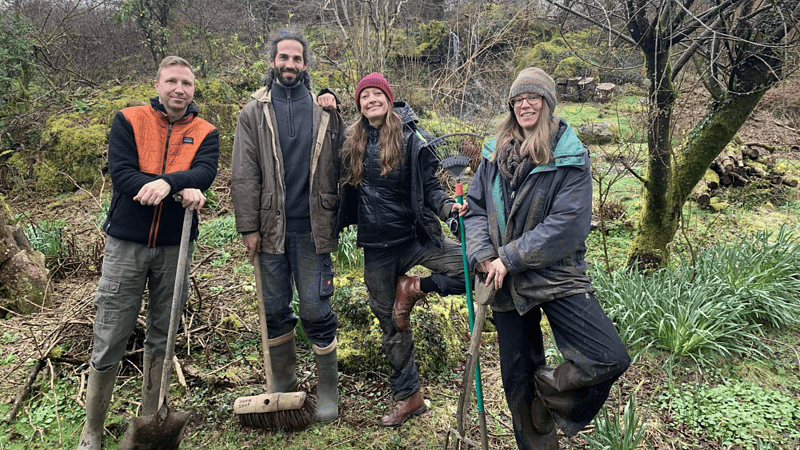
Conscious parenting
It’s not easy to be a kid! Gopala Amir Yaffir shares some simple ideas for more harmonious, conscious parenting
We all know that it’s not easy to be a grownup (and especially a parent!), but did you ever think about how challenging it is to be a kid?
Imagine every action of yours being scrutinised, always being told what to do and what not to do, needing to ask permission for everything, being rushed to stop playing and get into the car or to bed…maybe you can’t even reach the light switch!
Living in the same way as a grownup would be some kind of exotic torture.
Of course, I’m only half joking, but how can we ease the suffering of these poor little children?
First, let’s not forget, there are also great things about being a kid! People are shopping and cooking for you, driving you around, reading you stories, buying you toys; not much to worry about!
But kids do worry.
They worry about pleasing their parents and teachers, about not fitting in, about not being good enough, about not being a good person, about how they look. Lots of parents’ worries are transferred to their children; kids even worry about money.
I think that there are a few things that we guardians, parents or teachers can do to make it easier on our little ones. Here is some food for thought:
The ‘why’
Maybe instead of telling our children what to do, we can explain ‘why’. It is so important to know why we do things.
Obedience is not a great quality on its own. Would you like your child to grow up into an obedient adult? Obedience is comfortable for grownups and keeps the child safe at times, but understanding is a much better quality. This is why explaining the ‘why’ of things is so important.
Children start asking “why?” about everything when they are approximately three years old. Did you ever ask yourself why? Obviously, it is because they want to know why, they want to understand, and I think they deserve to.
Treat them as equals
Let the child’s opinion matter to you. Open things for discussion, and be ready to possibly accept what they are saying or reach a compromise.
The sentence “because I said so” will be unacceptable to hear as an adult in most circumstances, maybe aside from being a soldier.
In our free time, we grownups will choose to do things that are of interest to us, things that give us pleasure.
Yet, more often than not, especially in the mainstream education system, we force the direction of the learning or the activities. Interest-based learning is proven to be much more efficient than a forced one. After all, when we learn about anything, it helps us learn about everything. And I think that with children, most of all, we should aim to inspire our children to love learning.
Trust in the children’s wisdom to make worthwhile choices about what they want to engage with. And, of course, be by their side to guide and empower them along the way.
When I talk about children deserving to enjoy the freedom of choice, I’m not talking about anarchy. I was a great believer in anarchy in my early teens, but for this to work as a social structure each person needs to take full responsibility for their own actions. Children may not be ready yet for this absolute freedom, and having some basic reasonable boundaries makes them feel safe. Those boundaries serve as a warm hug saying: “You are safe here”.
Because of my own dislike of rules, I’ve tried to have no rules at all both at home and as a teacher. Soon I discovered how wise the sentence “freedom within safe boundaries” is. Since rules are hard to keep and are also not fun, I have minimised my rules to one single rule: respect.
Respect is the basis of all healthy relationships, including the ones with our children. But it needs to be mutual respect. It needs to work both ways, not just from the children to the parents. So what I’m suggesting here is not anarchy, but giving up dictatorship in exchange for democracy.
Co-create life together
Involve the child in some age-appropriate decision-making. Share your plan for the day or week; it should help them feel more at ease because they will know what to expect. Sharing your dreams with them makes them a part of that dream – create dreams together!
Let the child be the leader sometimes. At our home, we occasionally have ‘no “no” days’…these are days when I’m not allowed to say no! Sounds fun? It is! And most of the time our children make responsible and considerate choices with this superpower.
You may think it’s hard to need to say “yes” for a whole day, but it is actually easier than saying no. It’s going with the flow, which is pretty fun, even for grownups.
Personally, I love these days. Last week, with Delphin, my six-year-old daughter, I had the privilege of being led by her to the market in the morning, then for a swim on the beach, a picnic at the park, and some gardening in our backyard – a fantastic day!
It’s a whole lot more enjoyable to be a “yes” parent, still constantly and gently guiding the children to make better and healthier requests.
Pay off
Like in any relationship, in a parent and child, or teacher and student relationship, everything goes two ways – it is reciprocal.
The tables always turn. When we respect children, they respect us. When we listen to children, they listen to us. When we give children control, let them be leaders sometimes, they will happily let us lead too.
Try it out, it just might work!







